18+ Sample Event Vendor Agreement
-
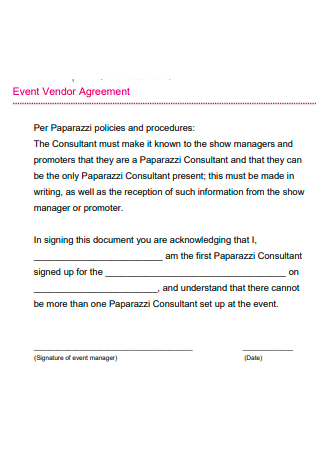
Event Vendor Agreement Template
download now -
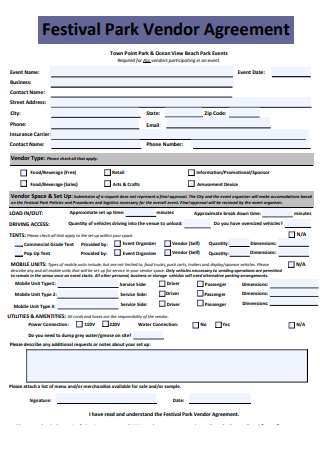
Festival Park Event Vendor Agreement
download now -
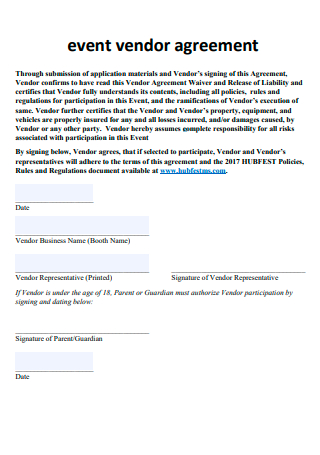
Event Vendor Agreement Example
download now -
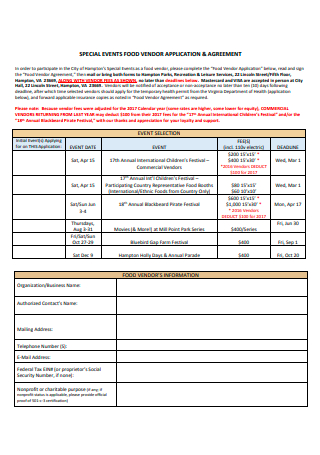
Special Event Food Vendor Application and Agreement
download now -
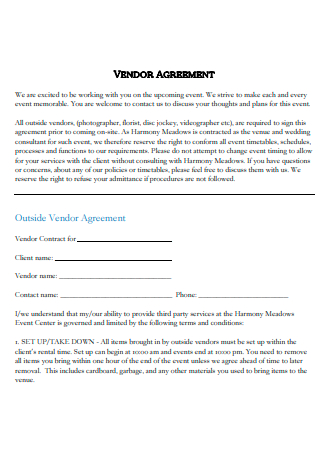
Printable Event Vendor Agreement
download now -
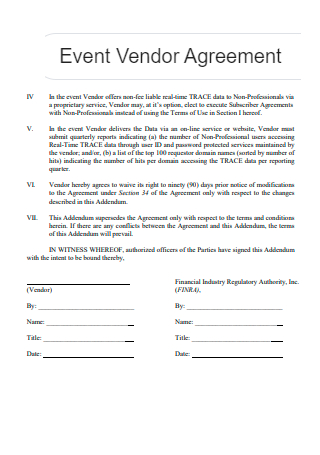
Event Vendor Agreement in PDF
download now -
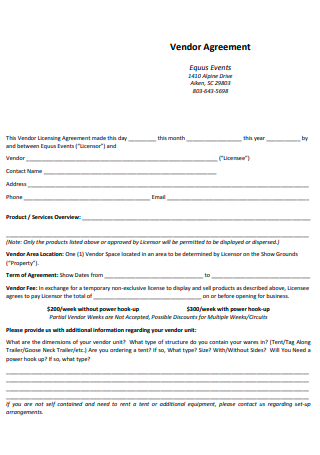
Basic Event Vendor Agreement
download now -
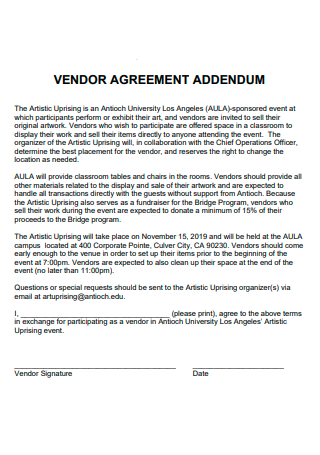
Event Vendor Agreement Addendum
download now -
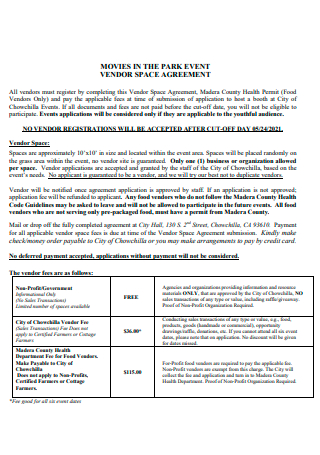
Event Vendor Space Agreement
download now -
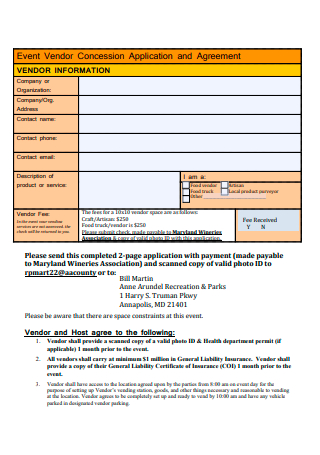
Event Vendor Concession Application and Agreement
download now -
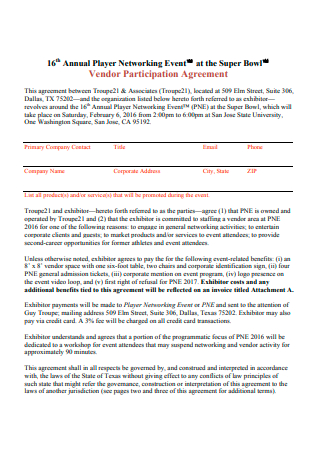
Networking Event Vendor Participation Agreement
download now -
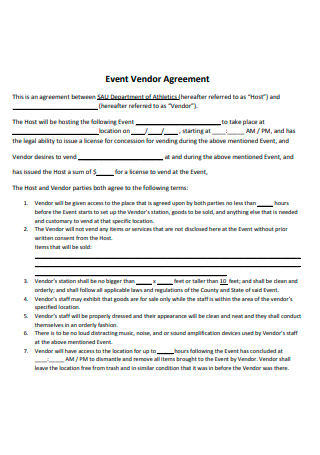
Sample Event Vendor Agreement
download now -
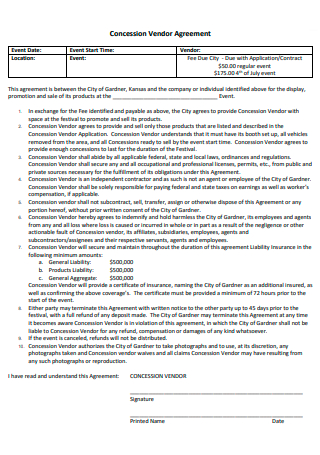
Concession Event Vendor Agreement
download now -
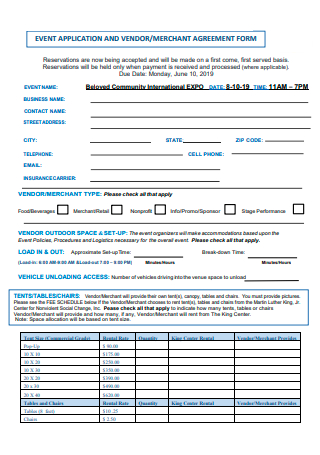
Event Application and Vendor Merchant Agreement Form
download now -
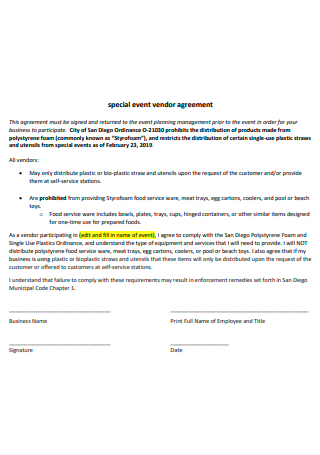
Special Event Vendor Agreement
download now -
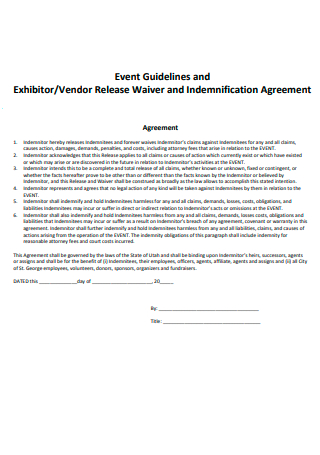
Event Vendor Release Waiver and Indemnification Agreement
download now -
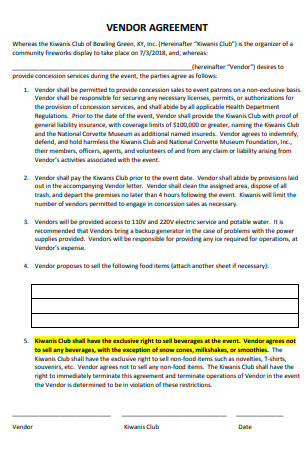
Event Vendor Agreement Format
download now -
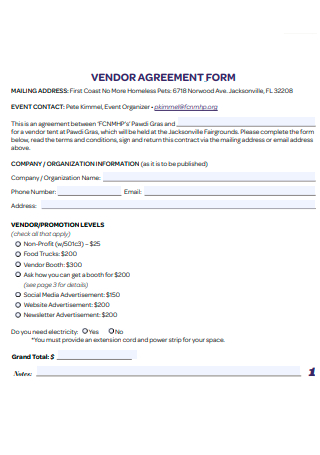
Event Vendor Agreement Form
download now -
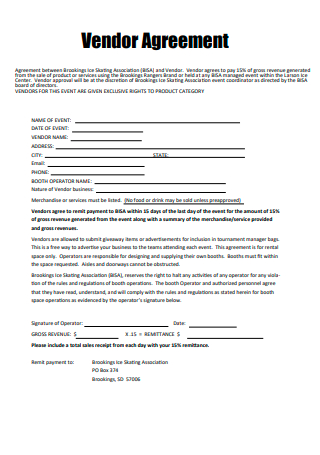
Standard Event Vendor Agreement
download now
What Is an Event Vendor Agreement?
An event vendor agreement is a formal written contract detailing the agreement established between an event sponsor, organizer or client with either a single vendor or multiple vendors. It is a contract meant to uphold the expectations and responsibilities of each consenting party.
According to an online article by Entrepreneur, selecting the right vendors for an event is crucial. The vendor you settle with can either make or break an event. Hence, research is key in looking for and determining the right vendor for an event. Details such as prices, lead time, area of service, discounts offered, refund policy and insurance coverage are important information that should be obtained from prospective vendors.
Types of Event Vendors
Depending on the type of event you are having, your list of suppliers and vendors might reach dozens. Most big-scale events require at least several outsourced suppliers because of the many requirements needed as well to run an event of such size. Whether it is a wedding or a global conference, the examples listed below are just some common examples of the various types of event vendors.
How to Create an Event Vendor Agreement
The content of an event vendor agreement would greatly depend on the type of event or occasion being held. However, there is still a need for structure when constructing these types of agreements. Simply follow the step-by-step guide below to start drafting a formal event vendor agreement contract.
-
Step 1: Establish the Consenting Parties
All formal and Written Agreements must first establish the parties entering into the agreement. In this case, the organizer or sponsor of the event enters into a contract with the event vendor or supplier. Make sure to include the full name of the representative or the complete name of the company for each participating party. This may already serve as an introductory line or paragraph in the written agreement. You also have the option to include the complete address of the organization or company. An event vendor agreement is a formal transactional form so it is crucial that it should be properly documented from the beginning.
-
Step 2: Describe the Event Details
Once you have duly introduced the parties involved, you need to make sure to provide full details of the event. Basic Information including the name, date, location of the event and other relevant information should be present in the first page of the contract. Every detail worth noting ought to be described in the agreement; and the more details you provide, the better. The format of your paragraphs may vary and would depend entirely on you. You can take liberties with style as well. If you prefer to use bold or italicized characters in emphasizing the event details, then do so.
-
Step 3: Draft the List of Services
An important section of an event vendor agreement is the description of services of the vendor. This should include the Scope Of Work as well as limitations of the job. This is important so as to manage expectations of both parties, especially the client. The client, organizer or sponsor of the event should know what is to be included in the services offered and what aspects are not part of the job. For each party stated in the contract, there must be a clear definition and delineation of roles and responsibilities. Whether event vendor or event organizer, each has a part to play in the successful planning and execution of an event- whether small or big. The description of services may be detailed in bullet points or clearly separated paragraphs. You just need to ensure that all vendor services are clearly and accurately listed.
-
Step 4: State the Terms and Conditions
Part of any official contract or agreement is the statement of terms and conditions. In the case of an event vendor agreement, the stipulations as set and agreed by the participating parties should be clearly stated and described in this section. Anything from payment terms, Release Of Liability clause, cancellation of contract, amendment of contract, schedule of delivery of services to duration of the agreement, are all considered terms and conditions that should be found in an event vendor agreement. These stipulations are arguably the most important part of an agreement because it is where expectations and limitations are drawn. You have the option to number these in logical order, arrange them in neat bullet points or use separate paragraphs for each stipulation.
FAQs
What should be in a vendor agreement?
A vendor agreement should always include the description of services and products, statement of terms and conditions and the event details in addition to the introduction of consent of both parties, namely the event organizer and event vendor. These are basic sections of a vendor contract; however, there may be additional sections as well depending on the needs and preferences of the parties.
How do I create a vendor agreement?
To create a vendor agreement, you first need to identify and establish the parties involved. The next step is to describe and outline each party’s respective roles and responsibilities. In addition, do not neglect to include the complete event details and the terms and conditions as well. You can easily choose an event vendor agreement template from the selection above so you do not have to start from scratch.
What is a vendor’s agreement?
A vendor’s agreement is a formal written contract between an event organizer or sponsor and an event supplier. The latter is considered the vendor or independent service provider who supplies the service or product that the event organizer needs in order to execute the event.
Event vendors can range from florists to food truck vendors to wedding singers. To ensure clear terms and to manage expectations, a sound and detailed event vendor agreement contract is needed. Browse the wide selection of sample agreement forms above to start customizing your own event vendor agreement now!
